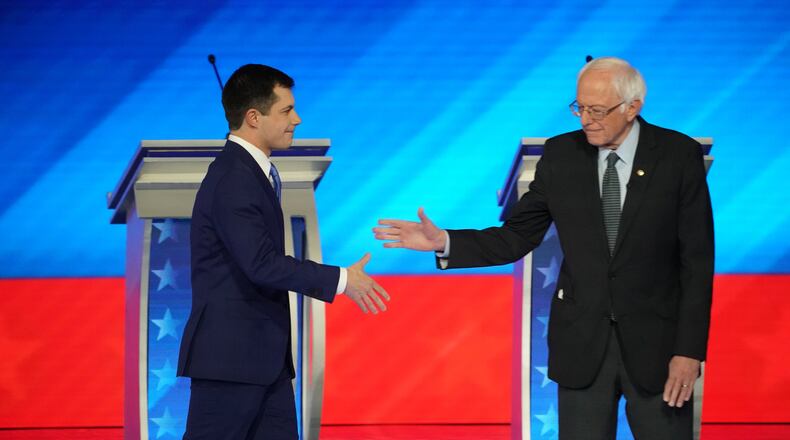RINDGE, N.H. — After a disastrous Iowa caucus that left the 2020 field as murky as ever, New Hampshire’s vote Tuesday should bring a more decisive result in the unsettled Democratic battle for the right to challenge President Donald Trump.
Most of the polls show a close race between former South Bend, Ind., Mayor Pete Buttigieg and U.S. Sen. Bernie Sanders after they finished one-two in the problem-plagued Iowa vote, and they’ve stepped up their attacks on each other while trying to drown out attention from their rivals.
With bigger crowds and more media attention, U.S. Sen. Amy Klobuchar is angling to join the top tier of candidates, promising her blend of “Klobucharge” will energize Democrats and win over wavering Trump supporters. A poor finish, though, could sideline her campaign.
It will be an equally important test for U.S. Sen. Elizabeth Warren, whose high visibility in neighboring Massachusetts once helped her rise to the top of the New Hampshire polls. That seems a distant memory, as she’s slipped to third or fourth place.
Former Vice President Joe Biden, showing an edgier side in recent appearances, has downplayed his chances in New Hampshire. He’s promised to continue his campaign through South Carolina, whose electorate more closely mirrors Georgia’s, but recent polls there show his advantage narrowing.
The president, meanwhile, was set to headline a massive rally late Monday in Manchester to capture some of the media attention and seed the ground for his November election in a state he lost by one-third of a percentage point in 2016.
Here are the storylines to follow:
What’s at stake:
Just like its early-voting cousin Iowa, the Granite State awards a tiny clutch of the 1,990 delegates needed to win the Democratic nomination.
But whoever captures the bulk of New Hampshire’s 24 delegates will also ride a wave of attention and energy going into contests in Nevada and South Carolina later this month and the sweep of more populous states that cast ballots on “Super Tuesday” on March 3.
What it means for Georgia:
It’s hard to draw any sort of comparison between the states. New Hampshire is far whiter, older, richer and tinier than Georgia — and Democrats in the two states don’t often think alike.
Four times since 1988, Democratic voters have diverged with their primary picks. That includes 2016, when Sanders easily won New Hampshire — and Hillary Clinton steamrolled him in Georgia a few weeks later.
Both Sanders and Buttigieg — the front-runners in New Hampshire — have struggled in polls in Georgia as well. The latest Atlanta Journal-Constitution survey showed Biden with the biggest advantage over Trump in Georgia — and far closer head-to-head hypothetical matchups between the president and the other Democratic candidates.
Bernie versus Buttigieg:
The two front-runners have tried their best to cast Tuesday’s vote as a one-on-one matchup, largely ignoring their rivals on the last day of campaigning before the vote.
Trailing Sanders by single digits in the polls, Buttigieg warned at a campaign stop in Plymouth that “we cannot risk alienating Americans at this critical moment” before taking a swipe at Sanders’ “Medicare for All” health care proposal as too costly.
He’s abandoned any mention of Biden in his stump speech, a sign that the ex-mayor no longer considers the former vice president a threat here. So has Sanders, who has embraced the high expectations with gusto.
At a rally at Franklin Pierce University in the snowy hilltops of western New Hampshire, Sanders told a snow-soaked crowd of supporters that “tomorrow could begin the end of Donald Trump.”
“If we win here tomorrow,” he added, “I think we’ve got a path to victory for the Democratic nomination.”
Warren’s last stand?
Not long ago, the race for New Hampshire seemed poised to be a battle between “neighbors,” with Sanders of Vermont and Warren of Massachusetts carving up support in New Hampshire.
Now, Warren would probably settle for a third-place finish in Tuesday’s vote in her backyard, matching the third-place finish last week in Iowa’s caucus.
Slipping further down the ranks would trigger more questions about whether her campaign has a viable path to the nomination, with votes looming in Nevada and South Carolina, where she’s long trailed in the polls.
On the campaign trail Monday, she emphasized a message of cooperation — and deliberately avoided attacking her top rivals. She told voters that she’d be the “unity candidate” who could appeal to dueling factions of the party.
Biden casts attention ahead:
It was an exercise in lowering expectations.
With polls showing Biden lagging the front-runners, the former vice president told CBS that the race is “just getting started,” and he touted polls that showed he had strong support among black and Latino voters who will decide contests later this month in Nevada and South Carolina.
“I’m still leading nationally,” he told the network.
And he told donors Monday that he would soon visit South Carolina, where his once-dominant lead in the polls is showing signs of strain, even as he focused his message in New Hampshire on the economy.
“Working-class and middle-class people are getting clobbered,” he told an audience in Milford.
Klobuchar’s big stand:
After a fifth-place finish in Iowa that left Klobuchar within striking distance of Biden, the Minnesota senator has enjoyed bigger crowds and a crush of media attention.
She’s attuned her message to appealing to Republicans, and she drew a boisterous cheer at a rally at a middle school in Salem when she praised Sen. Mitt Romney’s vote to convict Trump at last week’s impeachment trial.
The irony wasn’t lost on Klobuchar, who praised the Utah senator’s “courage and conviction” before adding:
“We know the world is upside down when a Democratic rally is cheering for the former Republican nominee for president.”
UPDATES: Follow AJC New Hampshire primary results after the polls close
About the Author
Keep Reading
The Latest
Featured




